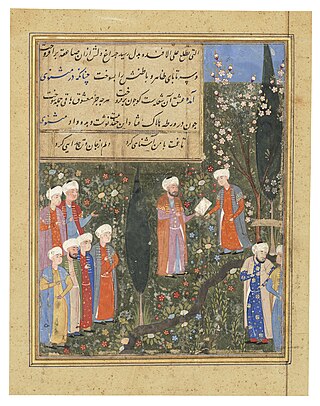
Sufism is a mystic body of religious practice found within Islam which is characterized by a focus on Islamic purification, spirituality, ritualism, and asceticism.

Shirin Ebadi is an Iranian Nobel laureate, lawyer, writer, teacher and a former judge and founder of the Defenders of Human Rights Center in Iran. In 2003, Ebadi was awarded the Nobel Peace Prize for her pioneering efforts for democracy and women's, children's, and refugee rights. She was the first Muslim woman and the first Iranian to receive the award.

Hashim Shah was a Punjabi writer and Sufi poet, best known for his story Sassi Punnun. His family migrated from Holy city Madina to Punjab, India, where they began living at Jagdev Kalan, the biggest village in Ajnala tehsil, Amritsar district. Hashim Shah was born in Jagdev Kalan in 1735 or 1752 and lived in that village his entire life. He wrote three stories "Kissa Kaw" named Sassi Punnu, Sohni Mahiwal, and Shirin Farhad.

The Qadiriyya or the Qadiri order is a Sufi mystic order (tariqa) founded by Shaiykh Syed Abdul Qadir Gilani Al-Hassani, who was a Hanbali scholar from Gilan, Iran. The order relies strongly upon adherence to the fundamentals of Sunni Islamic law.

The Ni'matullāhī or Ne'matollāhī is a Sufi order originating in Iran. The order is named after its 14th century CE Sunni founder and qotb, Shah Nimatullah, who settled in and is buried in Mahan, Kerman Province, Iran, where his tomb is still an important pilgrimage site. Shah Ni'matallāh was a disciple of the Suhrawardiyya Sufi ʿAbd-Allah Yefâ'î, advancing a chain of succession (silsilah) by Sufi qotbs and pīrs — claimed to extend from Maruf Karkhi.[citation needed]

Sufism is the mystical branch of Islam in which Muslims seek divine love and truth through direct personal experience of God. This mystic tradition within Islam developed in several stages of growth, emerging first in the form of early asceticism, based on the teachings of Hasan al-Basri, before entering the second stage of more classical mysticism of divine love, as promoted by al-Ghazali and Attar of Nishapur, and finally emerging in the institutionalized form of today's network of fraternal Sufi orders, based on Sufis such as Rumi and Yunus Emre. At its core, however, Sufism remains an individual mystic experience, and a Sufi can be characterized as one who seeks the annihilation of the ego in God.

Abu Ismaïl Abdullah al-Harawi al-Ansari or Abdullah Ansari of Herat (1006–1089) also known as Pir-i Herat "Sage of Herat", was a Sufi saint, who lived in Herat. Ansari was a commentator on the Qur'an, scholar of the Hanbali school of thought (madhhab), traditionalist, polemicist and spiritual master, known for his oratory and poetic talents in Arabic and Persian.

The Uwaisī silsila or tariqa (pathway) is a form of spiritual transmission in the vocabulary of Sufism, named after Owais al-Qarani. It refers to the transmission of spiritual knowledge between two individuals without the need for direct interaction between them.

Khalil Ahmad Saharanpuri was an Indian Islamic scholar of the Deobandi movement. He authored Badhl Al-Majhud Fi Hall Abi Dawud, an 18-volume commentary on the hadith collection Sunan Abi Dawud. He was also a Sufi shaykh of the Chishti order, being a disciple and successor of Rashid Ahmad Gangohi.
International Association of Sufism (IAS) is a California nonprofit organization headquartered in Marin County. It is a United Nations' NGO/DPI and the first organization established to organize an inclusive forum that opens a line of communication among Sufis all around the world. IAS launched a global intra-faith movement among Sufis and Sufi Schools.

Waris Ali Shah (1817–1905) was a Sufi saint from Dewa, Barabanki, India, and the founder of the Warsi Sufi order. He traveled to many places specially Europe and the west and admitted people to his spiritual order. He belongs to the 26th generation of Hazrat Imam Hussain رضی اللہ عنہ His shrine is at Dewa, India.

Aliqoli Mirza Qajar was an Iranian prince of Qajar dynasty and scholar who served as the first Minister of Science in Qajar Iran. He was the forty-seventh son of Fath-Ali Shah, King of Iran. Aliqoli Mirza was fascinated by the European Enlightenment and tried to spread its ideals in Iran. During the heyday of the Dar ul-Funun college, he was the headmaster of the school and played a key role in its survival.
Ali Kianfar is an Iranian Sufi master, author, teacher, philosopher and international speaker. He is a co-founder and co-director of the International Association of Sufism and Editor-in-Chief of the online journal Sufism: An Inquiry. He teaches Sufism and Islamic Philosophy.

Lataif-e-sitta are special organs of perception in Sufi spiritual psychology, subtle human capacities for experience or action. Depending on context, the lataif are also understood to be the qualities of consciousness corresponding to those experiences or actions.
Kashf al-Mahjub was the first formal treatise on Sufism, compiled in the 11th century by the Persian scholar al-Hujwiri. The work contains a complete system of Sufism with its doctrines and practices. Mystical controversies and current opinions are illustrated where many are clarified by presenting his experiences. The book with its Persian flavor of philosophical speculation and fiction is itself a piece of the identity of al-Hujwiri.
Abul Hasanat Sayyid Abdullah Shah Naqshbandi Qadiri also known as HadratAbdullah Shah Sahib, was a scholar of Islam and spiritual reformer. He is more particularly known as a muhaddith, honorifically as Muhaddith-e Dakkan. His contributions to Islamic scholarship and spirituality have left a lasting impact. His scholarly contributions include extensive writings on Islamic jurisprudence (fiqh) and his best-known work, Zujajat al-Masabih, which is a comprehensive collection of Hadiths aligned with the Hanafi school of law, compiled into five volumes.

Khayrat-é Hésan is a comprehensive biographical dictionary of prominent women in the Islamic world, written in Persian and compiled in three volumes by Mohammad Hasan Khan Maraghe’i, known as Etemad al-Saltaneh. A notable writer and politician of the Qajar era, Etemad al-Saltaneh organized this work alphabetically and documented the lives of distinguished women from the early Islamic period to his own time. Due to its writing style, use of varied sources, and comprehensiveness, this work is considered one of the significant historical records of its kind.







